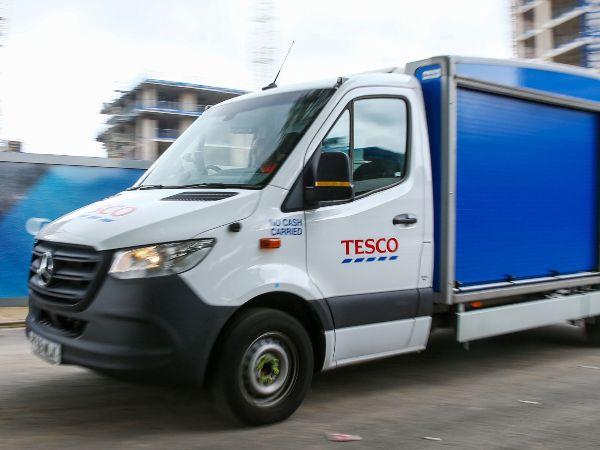Where next for FTSE 100 Tesco shares after Q1 results?
FTSE 100 Tesco shares remained broadly flat after solid Q1 results were punctured by economic warnings from CEO Ken Murphy.
 Source: Bloomberg
Source: Bloomberg
Tesco (LON: TSCO) shares made FTSE 100 headline news on Friday, at the end of a week of disquieting retail updates from the likes of ASOS, Boohoo, and Halfords.
Having cornered more than a quarter of the UK’s grocery market, Tesco has a uniquely insightful perspective on the wider UK economy.
And there’s bad news on this front.
Tesco share price: Q1 results
Tesco saw group retail sales increase by 2% year-over-year to £13.57 billion, a near 10% increase over pre-pandemic levels. While sales dipped slightly in the UK and Republic of Ireland, this was offset by strong sales at Booker, which rose by 19.4% to £2.1 billion, and its European operations, where sales increased by 9% to £976 million.
And despite UK sales falling by 1.5% to £9.88 billion, this was still up 8% on pre-pandemic levels. Of course, CPI inflation is at 9%, and the Bank of England expects the measure to exceed 11% by October. Arguably, sales are decreasing both in real terms and in terms of individual items.
But worse is to come. The Bank of England just raised the base rate for the fifth time in six months to 1.25%, with further increases likely as it expects to act ‘forcefully’ against inflation.
Tesco has now acknowledged that customers are facing ‘unprecedented’ inflationary pressures. CEO Ken Murphy told investors the ‘market environment remains incredibly challenging,’ and warned of ‘early indications of changing customer behaviour as a result of the inflationary environment.’
For example, many customers are now buying the cheapest available lines of wheat-based food that have spiked in price, such as bread and pasta.
And the CEO further highlighted that the FTSE 100 company is ‘seeing higher frequency shopping trips, so there’s an elevation in the number of shopping trips, we are seeing basket sizes coming down a little bit.’ Accordingly, while large store sales fell slightly, convenience store sales rose by 6.2%.
Much like Sainsbury’s CEO Simon Roberts, Murphy remains under pressure over his £5 million pay packet. But while accepting he is ‘well remunerated’ the CEO argues that ‘inflation is very real for everyone. Staying competitive on price is the most important thing we can do.’
 Source: Bloomberg
Source: Bloomberg
FTSE 100: where next for Tesco shares?
Food inflation leapt to 4.3% in May from 3.5% in April, its highest rate in a decade. And trade body IGD warns the measure could strike an incredible 15% over the summer, the highest in 20 years.
Moreover, polling for the BBC shows 56% of UK adults are reducing food spending to save money, with 81% worried about the rising cost of living.
And worryingly for Tesco, online sales fell by 15% in the quarter, as lockdown policies evaporated, and consumers returned to pre-pandemic norms. With orders falling and fuel at multi-year highs, the economics behind online grocery shopping is once again becoming precarious.
But Tesco’s most pressing threat is that posed by discounters Aldi and Lidl. Brewin Dolphin analyst John Moore thinks ‘the head to head approach the company has with Aldi and Lidl is likely to put pressure on Tesco to take some of the pain on prices.’
And Third Bridge’s Alex Smith thinks that while ‘Tesco’s market leadership gives it more bargaining power to negotiate down prices with suppliers,’ its ‘relatively limited product range and fragile reputation means it can’t push negotiations too far.’
However, Murphy argues that ‘the powerful combination of Aldi Price Match, Low Everyday Prices and Clubcard Prices is removing the need for customers to shop elsewhere.’
And the numbers back him up, with Tesco’s growing market share by 37 basis points in the quarter. Presumably, this growth is down to more consumers migrating to Tesco from traditionally more expensive competitors than it’s losing to the discounters.
Encouragingly, Smith expects the FTSE 100 operator to ‘continue to grow market share over the next 12 months’ as ‘its Clubcard scheme remains a competitive advantage for the Group.’ Further, with Asda and Morrisons taken over by private equity, their focus is likely to be on increased profitability rather than higher sales.
But to maintain or increase the market share that gives it such strong pricing power with suppliers, it will have to keep consumer prices low. And having stuck to its prior annual profit forecasts, Tesco might struggle to reconcile its promised profitability with bill cutting.
Of course, the best way to do this would be to increase sales faster than it cuts margin.
But the FTSE 100 grocer is facing a balancing act that looks eerily similar to a catch-22.
Trade over 16,000 international shares from zero commission with us, the UK’s No.1 trading provider.* Learn more about trading shares with us, or open an account to get started today.
*Based on revenue excluding FX (published financial statements, June 2020).





0 Comments
Recommended Comments
There are no comments to display.
Create an account or sign in to comment
You need to be a member in order to leave a comment
Create an account
Sign up for a new account in our community. It's easy!
Register a new accountSign in
Already have an account? Sign in here.
Sign In Now